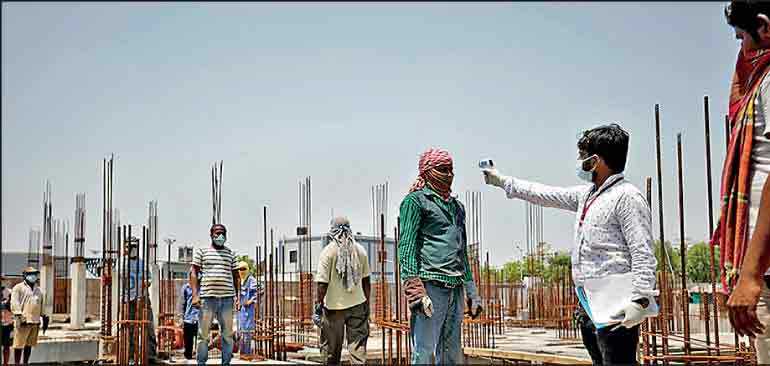Sunday Feb 15, 2026
Sunday Feb 15, 2026
Monday, 4 May 2020 00:55 - - {{hitsCtrl.values.hits}}

A health worker uses an infrared thermometer to measure the temperature of a labourer at the construction site of a residential building during a nationwide lockdown to slow the spreading of coronavirus disease (COVID-19) in Ahmedabad, India, April 30, 2020 - Reuters
TOKYO (Reuters): Asian policymakers must expand safety nets for the region›s huge pool of part-time and temporary workers most vulnerable to the economic devastation caused by the COVID-19 pandemic, the International Monetary Fund (IMF) said in a blog released.
Full or partial lockdowns to curb the spread of COVID-19 are having crippling effects on businesses and workers across Asia.
But those most vulnerable are so-called informal workers, or those in part-time and temporary jobs without social insurance, and in sectors of the economy that are neither taxed or not regulated in any form by government, the IMF said in the blog. Informal workers in the Asia-Pacific region account for nearly 60% of nonfarm employment, higher than in Latin America and Eastern Europe, and ranging from around 20% in Japan to over 80% in Myanmar and Cambodia, it said.
«Time is everything» in deploying effective policy steps to prevent such workers from falling deeper into poverty, as their family income would be at risk if they cannot work for extended periods of time, the IMF said.
Asian policymakers can save informal workers with a ‘New Deal’ program that provides immediate protection against the pandemic›s economic fallout, while addressing longstanding inequalities on access to health and basic services, it said. The program could include more expansive safety nets, and investment on digital platforms that offer education and financial services to a wider population, it said.
«The temptation to introduce universal cash transfers by ‹giving money to everybody› should be tempered by the goal of ensuring that adequate support goes to those most vulnerable,» the IMF blog said.
The blog was written by senior officials of the IMF›s Asia and Pacific Department, including its Director Chang Yong Rhee.